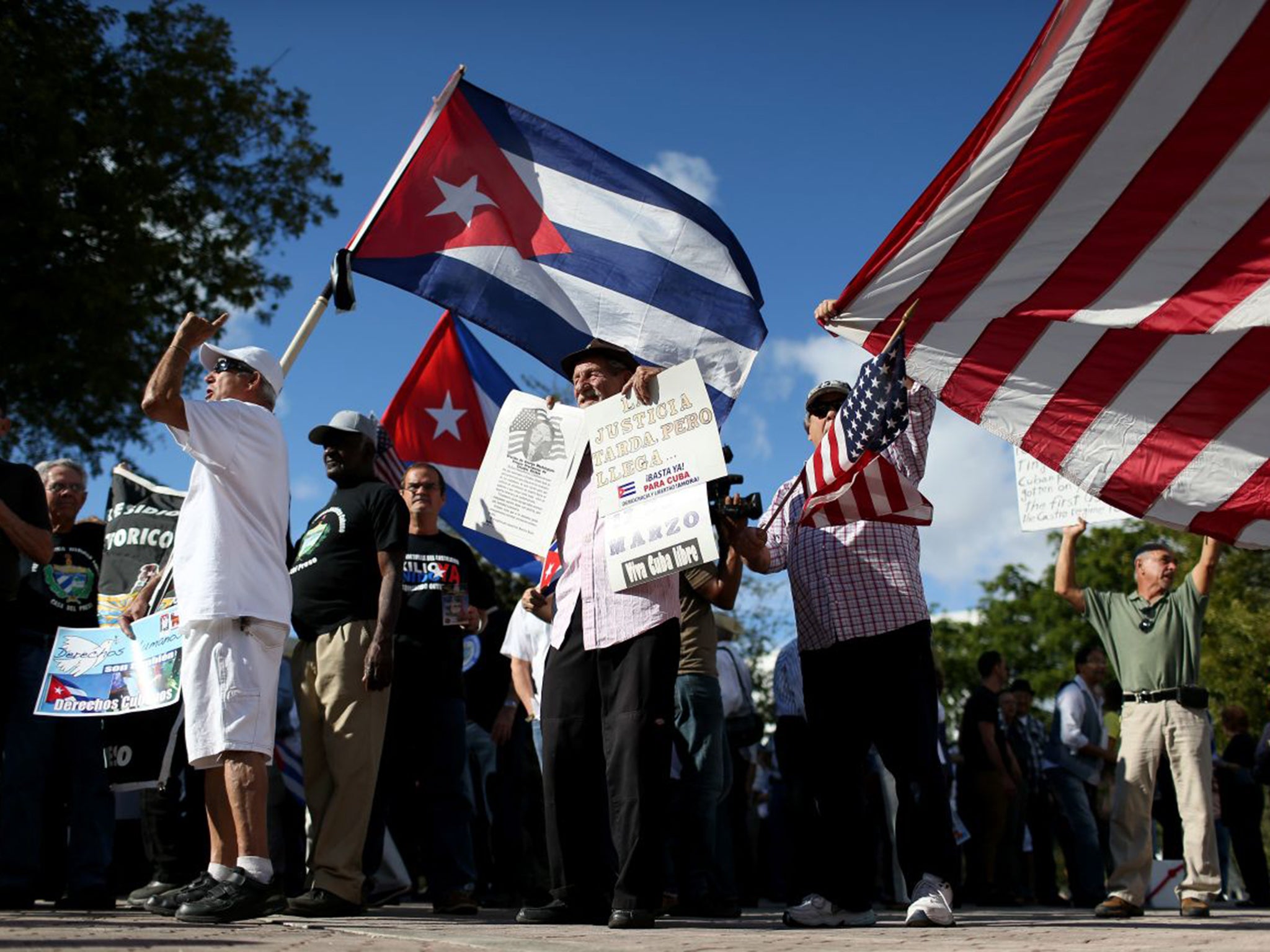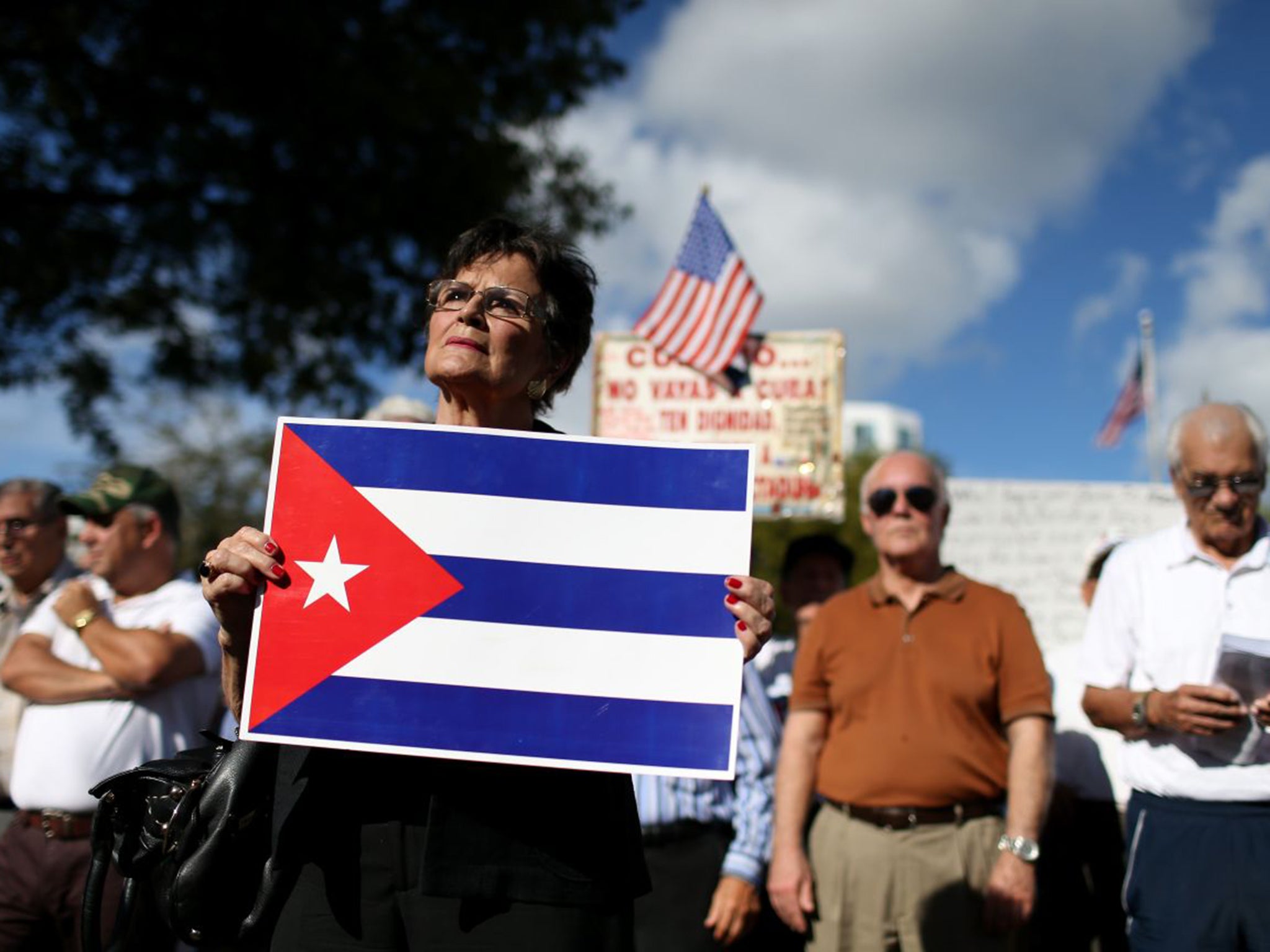Florida's Cuban exiles have mixed emotions over US rapprochement
Exiles who fled to Florida are not about to forgive the actions of the Castro regime

For so long, many of the exiles believed they would go back to Cuba in battle gear. They would vanquish Fidel Castro by any means necessary. “Next year in Cuba!” they would say when making a toast. Some trained in the Florida Everglades for the invasion that would surely liberate their homeland from the Communists.
“Unfortunately, those who trained in the Seventies and Eighties for an invasion, now they have to use a walker,” Tomas Regalado Jnr said.
He is the Mayor of Miami and 67 years old, one of the many Cuban Americans for whom Mr Castro’s revolution has been a multigenerational existential crisis.
Mr Regalado last saw Cuba when he was a boy, in 1962. He was put on a plane to Miami, supposedly a temporary measure while his parents stayed to fight Castro. His father, a journalist, spent two decades as a political prisoner. Father and son reunited in 1980 when Tomas Jnr was already a grown man with a wife and children. The Mayor said he would go back to the island only if the country became fully free and democratic, and he doubted it would happen in his lifetime.
Yet no one really knows anything for sure now. So much changed at midday on Wednesday, when Barack Obama stunned Miami’s Cuban Americans by announcing the restoration of diplomatic relations with Cuba. Suddenly “next year in Cuba” isn’t as implausible as it was a week ago.
The exile generation is not about to forgive the actions of the Castro regime, now led by Fidel’s younger brother, Raul. Disputes over private property continue; many exiles were elites on the island and have filed legal claims over property seized by the communists.
Many older exiles view Mr Obama’s actions as an appeasement and believe recognition of the Castro government will tighten the Communist grip on an oppressed populace. “Horrible. Horrible. What he did was repulsive,” Ana Maria Lamar, 70, who left Cuba in 1970, said the day after Mr Obama’s announcement. “Obama said Castro was no longer a terrorist. Come on!”
Miami has evolved, though, and the most prominent exile organisation, the Cuban American National Foundation (CANF), conspicuously greeted Mr Obama’s announcement with mild expressions of concern but no condemnation.
“It’s been gut-wrenching. It has reopened wounds in this community,” Jorge Mas, the chairman of CANF, said. But then he pointed out the window of his 12th-floor office, which looks straight down SW 8th Street – Calle Ocho – to the Versailles restaurant, a landmark gathering place for Cuban exiles.
“Look at the reaction two days ago – 20 people there, protesting,” he said. “[In] Hialeah, there were celebrations. Our community has changed. I never say it is divided. It has just changed.
“There are 15 to 20,000 people arriving every year who have a different life experience than my parents’ generation.”
People are calling him, dismayed, furious, heartbroken by the diplomatic thaw. He tries to calm them. He agrees that the diplomatic move gives Raul Castro a stature he does not deserve, but he sees positive elements in the change in policy. For example, changes in telecommunications policies will give Cubans on the island greater access to the internet.

“Our tactics have to change, but the endgame doesn’t change,” Mr Mas said. “Ultimately, what I tell all of them is that we will prevail. We will soon be witnessing a free and democratic Cuba.”
Mr Mas is 51 and was born in the US. His father was Jorge Mas Canosa, a co-founder and the chairman of CANF, and a man who under certain circumstances might have returned to the island as president of a post-Castro Cuba. The elder Mr Mas died in 1997. It was around 1995 or 1996 he realised that there would not be a sudden collapse of the Castro government, his son said.
The co-founder and president of CANF, Francisco “Pepe” Hernandez, 78, remembers travelling to Moscow with Mr Mas Canosa in December 1991, after the Communist bloc had disintegrated. Leaders of the new Russian Federation were eager to meet with the anti-Castro exiles, and they told Hernandez and Mr Mas Canosa: “Cuba is going to be next.”
But Cuba wasn’t next. Despite the disappearance of the Soviet Union as his patron, and despite the continued US embargo, Fidel Castro hung on to power. In 2006, ailing, he passed control of the government to his brother, Raul.
Mr Hernandez, like the Mayor, doesn’t expect to go back to Cuba unless the Castros are completely gone. And the Cuban government certainly would not welcome him: he said he’s considered a terrorist because of his decades of anti-Castro activism. The rapprochement between the US and Cuba caught him by surprise.
“Fidel Castro must be dead, in a coma or completely absent from reality,” Mr Hernandez said.
© Washington Post
Join our commenting forum
Join thought-provoking conversations, follow other Independent readers and see their replies
Comments
Bookmark popover
Removed from bookmarks